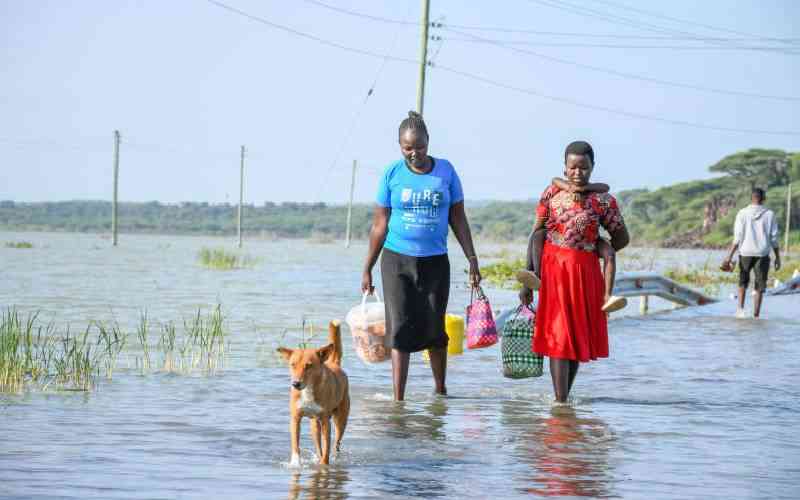Residents of Loruk wade through the submerged Marigat–Loruk road, after Lake Baringo’s rising waters flooded the key route, on September 3, 2025. [Kipsang Joseph, Standard]
Floods, droughts and heatwaves are causing havoc in Africa, disrupting lives, undermining economies and threatening already vulnerable communities. While the continent contributes less than four per cent to global greenhouse gas emissions, it bears a disproportionate burden from climate extremes.
From tomorrow, African countries will gather in Addis Ababa for the Second Africa Climate Summit. Deliberations will focus on how to tackle climate challenges through new financing and adaptation measures. At the heart of these discussions lies a simple, sometimes overlooked fact: That the impact of climate change is most acutely felt through water. Either it’s too much, too little or too polluted or a combination. Climate smart water resources management is therefore key to adaptation.
Many African river basins and aquifers span complex climatic zones and fragile socio-economic conditions. For example, the Nile basin traverses 11 countries, across arid and semi-arid, humid and semi-humid climatic zones, and the water demand is fast outstripping the available river flow. The Merti aquifer in Kenya and Somalia is another water system in a complex and fragile state, and a source of drinking water for about 12 million people. Africa’s water crises are getting worse due to rising temperatures and extreme weather conditions along with challenges like rapid population growth, inadequate infrastructure, weak governance and instability.
Follow The Standard
channel
on WhatsApp
Despite financial constraints, Africa is richly endowed with natural assets that must be used sustainably. This demands context-specific, science-grounded and socially acceptable solutions centered around water. What will form the backbone of short and long-term effective adaptation measures are strategic water resource assessments, mapping drought and flood-prone hotspot areas, robust monitoring systems, watershed protection and restoration, and climate-resilient policies that reduce inequality.
Adaptation strategies should leverage Africa-led research, partnerships and technological advances. Today, digital solutions are enabling smarter allocation of scarce water among competing users during droughts, and rapid flood mapping for disaster response. In addition to supporting emergency response, they improve the predictive capacities of climate extremes for better operational planning and management of water infrastructure. By increasing water availability and improving how water is managed, used and distributed, Africa can reduce its vulnerability to climate change impacts.
To support these strategies, credible science should be at the core of climate resilience and adaptation. African leaders and decision-makers must invest in and spearhead practical solutions. Firstly, discussions and actions should focus on issues such as improving data, information and knowledge generation to support policies that are timely and reliable for decision making and investments. Secondly, there is need to explore how Africa-led research can produce context-specific and scalable solutions that provide water access to different users and reduce inequality, including the competing needs from water, food and energy systems and the environment. Thirdly, there should be smart, practical interventions to strengthen communities’ resilience as they encounter climate shocks. Finally, Africa must prioritise water infrastructure investment from its own resources and through innovative financing schemes for meaningful adaptation.
As Africa charts its climate future, water should not be a side note – it must be the main agenda.
Dr Meron is a water and climate systems researcher at International Water Management Institute
Follow The Standard
channel
on WhatsApp
By Meron Teferi Taye
